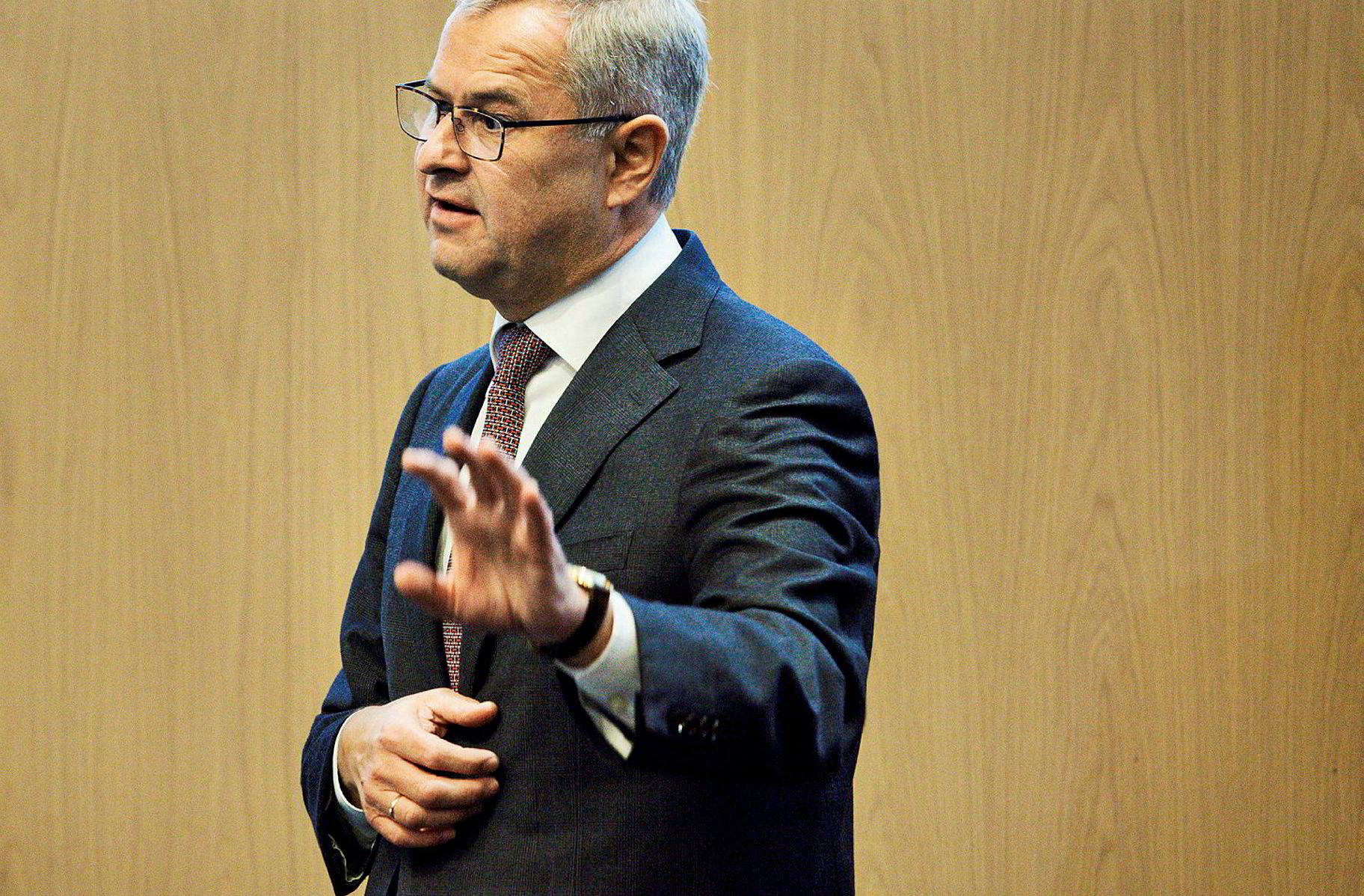Danish boxship giant AP Moller-Maersk has posted a loss in the fourth quarter as it adjusted vessel capacity to protect its margins.
The group said the net deficit was $61m, against a profit of $44m in the same period of 2018, while it also paid more tax.
Ebitda increased by 1% to $1.5bn.
The annual result came in at a loss of $44m versus a profit of $3.2bn in 2018, when it was boosted by a $3.8bn gain from discontinued operations.
The ocean division, which includes the containerships, produced Ebitda of $1.09bn from $1.14bn in 2018, as the margin decreased to 15.5% from 15.8%, due to lower volumes from a weaker market and the capacity tweaks to fit the fleet to market developments.
Chief executive Soren Skou focused on the Ebitda performance when he said: "Despite weaker market conditions, we were able to improve profitability and cash flow.
"Our cash return was healthy and we continued the reduction of net interest-bearing debt, leading to a further deleveraging of $3.3bn over the year."
He added: "It gives us a stronger starting point for 2020 to further expand our end-to-end offering within container logistics while at the same time manage the challenges that are obviously out there."
Rebound coming
Skou told Bloomberg TV that Maersk is positioning itself for a strong rebound in two months, based on an expectation that the fallout from the coronavirus on global trade may soon peak.
“Over the last two and a half weeks we have seen a steady decline in the number of new cases” and “that is positive”, he said.
“It means, very well, we could be set for a peak within the next two weeks. If that were to be the case, then we would expect a very weak March and a rebound in April — a sharp rebound in April."
He added: “But there is still a lot of uncertainties out there.”
Below expectations
Fearnley Securities said the result was below expectations operationally and financially.
But it added: "All-in-all, we don’t think this comes out too soft, with Maersk continuing to generate 10%-plus free cash flow yield due to low spending."
Looking ahead, it said: "Overall we struggle to see the market tightening significantly in 2020, with risk on both spot/contract rates in the short term.
"In China, freight rates are now beginning to show the impact of the virus outbreak, despite carriers' efforts to reduce capacity."
Fearnley Securities added: "In effect, shippers find themselves between a rock and a hard place when trying to export from China, balancing but lower rates and limited cargo."
It reiterated its hold stance on the stock.
Freight rates dip
Maersk said boxship profitability decreased slightly compared with a strong year-ago period.
"However, continued strong focus on margins through cargo selections and capacity management kept freight rates largely on par and shielded margins, despite weaker market environments," it added.
Costs were positively impacted by continued capacity management, improvements in bunker efficiency and lower fuel prices.
Revenue decreased by 3.4% to $7bn, hit by volumes falling 1.8%. There was a decrease of 0.4% to $1,905 per foot equivalent unit (feu) in the average loaded freight rate.
Total boxes carried reached 3.29m feu, down from 3.35m feu, as trades on East-West and North-South routes weakened.
Rates were also impacted by the developments in foreign-exchange rates.
Vessels idle
At the end of the year the fleet consisted of 307 owned and 401 chartered vessels, with 348,000 teu idle (35 vessels), mainly due to retrofits of scrubbers.
Its idle capacity corresponded to 25% of the total in the whole market.
Capital expenditure was $469m, mainly related to investments in gateway terminals, in Logistics & Services and retrofitting of vessels.
"A strong commitment to capital discipline and a focus on free cash flow generation continues to be a key focus area," the company said.
Logistics & Services improved Ebitda by 33% to $32m, while the figure for gateway terminals increased 11% to $251m.
Net interest-bearing debt was reduced to $11.7bn at 31 December.
Big year ahead
Looking ahead, Maersk expects Ebitda of $5.5bn for 2020, before restructuring and integration costs.
This guidance sits 7% below consensus expectations.
"The organic volume growth in ocean is expected to be in line with or slightly lower than the estimated average market growth of 13% for 2020," Maersk said.
"The outlook and guidance for 2020 is subject to significant uncertainties and impacted by the current outbreak of the coronavirus in China, which has significantly lowered visibility on what to expect in 2020."
It added: "As factories in China are closed for longer than usual in connection with the Chinese New Year and as a result of the coronavirus, we expect a weak start to the year."






